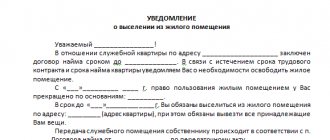Dormitories include specialized residential premises located in buildings specially built or re-equipped for these purposes. In accordance with the law, these premises must be equipped with the necessary furniture, as well as standard things needed for living. The dormitory is occupied temporarily under a tenancy agreement between the homeowner and the tenant, under a social tenancy agreement for citizens recognized as needing residential premises, in accordance with labor legislation, for the duration of official or labor activity, and for the period while their studies last, when non-resident students enroll in higher education educational institution.
Why can you be evicted from the hostel?
There are several grounds for terminating a hostel accommodation agreement - a rental agreement for specialized residential premises. The first two - by agreement of the parties and by decision of the citizen-tenant - do not fall under the concept of “eviction”, and therefore will not be considered further.
Let’s take a closer look at the remaining reasons for which the right to live in a “dorm” can be deprived:
- Termination of employment or holding an elected position;
- Completion of studies (or termination due to expulsion).
- Termination of official activity or dismissal from service;
- The death of a person living alone in a dormitory or the cessation of existence of the living space itself. It is rather a termination of the tenancy agreement for reasons beyond the control of either party;
- If the tenant and his family (if any) found a new living space and moved there. The rental agreement is considered terminated from the date of relocation;
- Transfer of ownership rights, economic management or operational management of the hostel to another person, excluding those cases when this person is one of the parties to the employment contract concluded with the employer-employee;
- At the unilateral request of the lessor. This precedent can only occur after applying to the judicial authorities and by an official court decision. The grounds for filing an application with the court may be as follows:
- When a person occupying a room in a dormitory, or members of his family, do not fulfill the obligations specified in the rental agreement for specialized residential premises;
- If the tenant does not pay for housing and (or) utilities for a period exceeding half a year;
- When the tenant or those individuals for whose actions he is responsible damage or destroy the residential premises;
- If a citizen living in a hostel uses this premises for other purposes. This means the actual transformation of a residential premises into non-residential premises and its use as an industrial warehouse, office, industrial premises or for breeding animals (Article 17 of the Housing Code of the Russian Federation);
- If, through the fault of the tenant, the legal rights and interests of neighbors are regularly violated, which complicates the ability to live together with them in a common living space.
Purpose of dormitories
Dormitories are provided for temporary residence of working citizens, students, and students of other educational systems.
It is impossible to live in special types of premises without working or studying; in fact, these buildings are built for one purpose - to solve people’s temporary difficulties with housing. Dormitories belong to individual institutions, enterprises or organizations. These buildings are equipped with everything necessary for life: furniture, cultural and household items that allow residents to relax, study, prepare food, and carry out hygiene procedures.
The main purpose of such premises is to provide shelter to individual citizens or families until they resolve their housing issue. Often, nonresident citizens who do not have real estate in a given area, and often have relatives in this city, apply to move in.
Who has the right to evict from dormitories?
Any person (for example, a neighbor) whose rights and interests are violated in accordance with Articles 101 and 83 of the New Housing Code can write a claim or notification. But only the owner of the hostel can file a petition with the court or independently make a decision on eviction, depending on the current situation.
By law, any tenant must be notified in writing of the need to vacate the premises three months before the expected date of eviction.
What should a student do?
A student, having received a notice requiring him to voluntarily vacate the premises, must carefully study the reason that led to the decision to evict, and also re-read the lease agreement, especially the part that concerns the grounds for its termination.
If he does not consider his disciplinary offense sufficient for eviction, he should prepare for a court hearing in order to provide sufficiently strong evidence and arguments in his favor.
Having received a court decision on eviction, you can file an appeal to a higher authority within two months. And don’t forget that while the trial is ongoing, you have every right to legally live in the hostel.
Who can and cannot be evicted
Any category of citizens is subject to deprivation of the right to live in a hostel and eviction.
According to the law, there are two options for eviction from hostels:
- Without providing other living quarters;
- With the provision of other residential premises within the boundaries of the locality in question.
IMPORTANT: The provided residential premises, according to the new Housing Code of the Russian Federation, must be located in the same locality as the vacated premises, but do not have to be comfortable in relation to the given region (see Article 89 of the Housing Code of the Russian Federation).
If we compare it with the previous Housing Code of 1983, the list of those categories of citizens who cannot be evicted from a hostel without providing other living space has been significantly reduced . It did not include single citizens living with minor children, WWII veterans who fought in active army units, people who worked for the landlord for more than ten years, etc.
The following categories remain:
- Citizens of old age retirement age;
- Citizens who are family members of a deceased employee who lived with him in a dormitory during his lifetime;
- Disabled people of the first two groups who received injuries or illnesses that caused disability during the performance of official or military duties, or as a result of work activity;
- Family members of citizens who were in government or military service and went missing or died in the line of duty.
Another important point. The listed categories of citizens, when evicted from a hostel, cannot fail to receive another living space only on the condition that they are not the owners or family members of the owner of another housing, as well as tenants or family members of the tenant of the residential premises under a social tenancy agreement and are registered as those in need of housing. housing for citizens of the Russian Federation.
A separate category of persons includes orphans, children without parental care and persons from among both. This category of citizens can be evicted from the hostel only with the condition that they be provided with another comfortable premises within the given locality.
Labor Relations. What if they weren't there?
As Article 109 of the Housing Code of the RSFSR states, the hostel is intended for the residence of workers, employees, students, pupils, as well as other citizens during the period of work or study. Termination of employment is grounds for eviction. What if a room in a dormitory was provided to a person who is not in an employment relationship with the organization that runs the dormitory? After all, Article 110 of the Housing Code of the RSFSR (as well as Article 105 of the Housing Code of the Russian Federation) allows for the eviction of only workers who have stopped working. It is not difficult to guess that persons moved into the hostel not in connection with labor relations cannot be employees who have stopped working. This means that it is impossible to evict these persons on the basis of “termination of employment relations.”
A completely logical question arises here: why is it impossible to evict, without providing another living quarters, persons who, strictly by law, did not have the right to move into the hostel, since it is only for “our own people”?
And the law makes it possible to evict such a person, only not on the basis of Article 110 of the RSFSR Housing Code, but by declaring the order invalid in court. The reason for this may be precisely the lack of conditions for the provision of living quarters. However, a request to invalidate an order can only be filed within three years from the date of its issuance. This logic is also followed by the Supreme Court, which expressed the same opinion in the Resolution of the Plenum back in 1984:
“..If the hostel was provided to a citizen who is not among the persons who have the right to be provided with living space in the hostel, and a claim for eviction is filed against said person on this basis, it is necessary, in relation to Art. 48 of the Housing Code of the RSFSR, to resolve the issue of invalidating the order for the occupation of living space in a hostel with the onset of the consequences provided for in Art. 100 of the Housing Code of the RSFSR."
But even if the order is declared invalid for reasons not related to the unlawful actions of the persons who received the order, the citizens specified in the order are subject to eviction with the provision of another residential premises or premises that they previously occupied.
The procedure for eviction from a hostel according to the new Housing Code
As mentioned earlier, according to the new Housing Code, if a tenant (tenant) wants to move out of the hostel, he can terminate the tenancy agreement unilaterally at any time.
In the event that a landlord attempts to evict a tenant through legal proceedings, the procedure is as follows:
- Before going to court, the owner of the residential premises must send the tenant an eviction notice with an offer to voluntarily leave the occupied space;
- If a good agreement cannot be reached, then the lessor files a claim in court;
- Once the eviction order goes into effect, the clock begins to count down for the evicted tenants. They are required to leave the hostel on their own after seven days. Otherwise, the bailiffs have the legal right to use force.
IMPORTANT: Housing legislation regulates relations regarding eviction from a hostel only in cases where the building belongs to the municipal housing stock or is under state support. If the hostel is privately owned, civil law rules come into force.
Eviction of a student from a student dormitory
Nonresident students, after entering a higher education institution, are provided with rooms in dormitories in accordance with Russian legislation.
Eviction from the hostel under such circumstances can only occur in three cases:
- At the student’s own request at any time;
- If there is an order for expulsion from the university, the dean’s office automatically signs an order for eviction from the hostel;
- After a court decision for violating the rules of residence or for other reasons. The petition to the court is submitted on the initiative of the hostel administration.
An employee who is being laid off from work
The term layoff implies a complete termination of the employee's employment relationship with the employer. And in this case, the employer is no longer obliged to provide living quarters for the former employee.
Since, according to the Labor Code of the Russian Federation, workers are warned about layoffs at least three months before the actual dismissal, they have enough time to find other housing.
If there is a child under 18 years of age
According to the old Housing Code, families with minor children were included in the group of citizens whose eviction without the provision of similar living quarters was prohibited by law. The new Housing Code of the Russian Federation does not provide for such a clause. That is, in a certain state of affairs, by a court decision, citizens with minor children can be evicted without providing other housing conditions .
The exception is for citizens who moved into a hostel under a rental agreement before March 1, 2005, when the new Housing Code of the Russian Federation came into force. In this case, eviction without providing other housing is impossible.
In practice, there is no clear answer to the question of whether, for example, a single woman with a minor child has the right to evict. The courts are very loyal to such situations and often make decisions in favor of the citizen defendants.
For non-payment
The new Housing Code of the Russian Federation stipulates that a rental agreement for residential space can be canceled by the landlord unilaterally through the court in the event of more than six months of overdue debt on rent or utilities.
In judicial practice, there are cases when the court decides to give the tenant a last chance to pay off debts, allow a deferment of eviction and set a payment deadline of up to 12 months. Upon expiration of this period and when the landlord re-applies to the judicial authorities, an unambiguous decision is made to evict these tenants.
Former spouse
Eviction of an ex-husband or wife from a hostel is possible only by court decision. But in the case where the former other half is also a tenant under a rental agreement or works or performs official duties in the employer’s organization, the court has the right to refuse the petition.
It also matters if the ex-spouse has another place of residence. In the absence of this, the chances of success in court are even less.
"Good faith" move-in
The bulk of citizens living in dormitories today moved in during the period of the RSFSR Housing Code, that is, until March 2005. It often happened that a person was moved in due to labor relations, but on the verbal order of the head or commandant of the hostel, and there was no order to move in at all. However, of course, this was not the employee’s fault, because he did not break the law. And there was no reason not to trust the leader’s words: “yes, you move in for now, and I’ll give the order to the commandant myself!” And indeed, according to the law, when moving into a dormitory, the warrant is handed over to the dormitory administration.
Let's give an example. The administration of the enterprise (plaintiff) goes to court with a claim to evict the defendant due to the lack of a warrant to move in. Considering one of these cases, the judicial panel of the Supreme Court came to a fair, in our opinion, conclusion:
“..D. She moved into the hostel by agreement between the management of the organization where she worked and the administration of the plaintiff, i.e., not arbitrarily; she did not allow any abuses or violations when moving into the hostel. On the contrary, the plaintiff violated the procedure for providing living space in the dormitory. The court of first instance found that a warrant to move into the dormitory was not issued not only to the defendant, but also to other persons living in it. Under such circumstances, based on the content of Part 1 of Art. 40 of the Constitution of the Russian Federation and Part 4 of Art. 10 Housing Code of the RSFSR... there were no legal grounds for... evicting D. from the hostel without providing her with other living quarters.”
Deadlines
There is such a thing in Russian legislation as a statute of limitations regarding the issue of eviction from a hostel. If three or more years have passed since the time when the employment relationship of the employee living in the dormitory with the organization providing housing actually ceased, it will no longer be possible to forcibly evict this tenant.
As for the time frame for considering an eviction case in court, it is a maximum of 2 months.
To vacate the premises, if the court has a positive decision on eviction, residents are given, as mentioned earlier, one week, after which the eviction will be forced.
Rules and responsibilities for students living in the dormitory
Every student who receives a place in a dormitory must sign an agreement. This agreement will specify the rights and responsibilities of the student.
If the rights of a student include: residence until the end of studies and use of all equipment in a general dormitory, then there are many more points in the responsibilities.
- All house rules and house rules must be followed. That is, you need to come and leave only at the permitted times. Do not bring strangers to visit, except on parent's day.
- Treat inventory and equipment with care. Use electricity, gas and water economically.
- Always keep the room clean, clean up after yourself in general areas, and perform routine cleaning on the floor.
- Manage to pay rent and utilities on time. Do not exceed the debt.
- If material damage occurs, it must be compensated. For example, if it was you who broke a bed that is already 15 years old, then you will be the one who will compensate for the damage.
- Listen to the elder (commandant and watchman) and comply with the provisions of the agreement concluded with the university administration.
So, a student has many responsibilities. Therefore, if you try, you can prosecute a young man for not following at least one rule.
This is how students are evicted from the dormitory if they violate only one regulation or do not listen to the commandant.
Application for eviction: sample
To initiate eviction proceedings, you must file a claim with the court. In this case, the court must be located at the defendant’s place of residence, that is, in the area of the hostel in question.
According to the Civil Procedure Code of the Russian Federation, the following data must be indicated in the statement of claim:
- Name of the court;
- Information about the plaintiff. (full name, address of registration or actual residence, contact numbers);
- Information about the defendant;
- The legal rights of the plaintiff that were violated by the defendant, that is, the demand for eviction;
- The reasons why the plaintiff intends to evict the defendant and supporting evidence;
- List of documents attached to the application.
The application will need to be accompanied by documents confirming the landlord's right to evict the tenant, including a notice of eviction (preferably signed by the defendant). Then you will need to pay the state fee and attach a receipt of payment to the papers.
statement of claim for eviction from the hostel. ⇐
The court may also request copies of the statement of claim according to the number of defendants and other involved citizens. A sample statement of claim for eviction from a hostel can be requested directly from the court.
Documenting
Clause 10 of the Model Rules for Living in a Dormitory states that when a student evicts, an order from the rector must be issued to carry out this procedure.
Such a document is drawn up not only when a student is evicted from a dormitory for violating accommodation requirements, but also in other situations:
- termination of a social rental agreement between the parties on the grounds specified in its terms;
- expulsion of a student from an educational institution;
- eviction at the personal request of the student;
- end of the training period.
It is not necessary to indicate students’ personal information in the order if there is a mass eviction. From the text of the document it should be clear what category of persons the student who must leave the temporary residence institution belongs to. The legislation does not impose requirements for the preparation of other mandatory documents that must accompany the eviction of the student. If the procedure for eviction of a student is carried out ahead of schedule, then a different procedure will apply to it. Early eviction must be carried out in court. The manager’s order will not be enough in this situation. Current legislative standards do not allow the manager to issue other documents to evict a person in court. The court may consider the penalty applied to a tenant in the form of eviction to be incorrect if he had not previously been given a warning or reprimand. Before evicting a negligent student, the hostel administration must send him a written notice with the date the premises will be vacated. This must be done so that the student has time to find a new place to live. Such a document is delivered in person or by mail, with mandatory notification of receipt. It is possible to give a student a verbal eviction notice, but if the case goes to trial, you will need to provide proof that the person was notified. You cannot evict a student if he lives in a dormitory with his minor child. Exceptions are cases of forced eviction for systematic violation of the rules of residence in the hostel. In other cases, such eviction is illegal. If several people live in a room, and one is evicted, then the remaining residents must write receipts stating that they did not participate in violating the internal regulations. Otherwise, such an action by the hostel management will be considered illegal and may be challenged by the student in court. In order to evict a student ahead of schedule, the interested person (in this case, a representative of the administration) must contact the judicial authorities at the location of the temporary residence institution and put forward claims.
The application to the court must contain the following information:
- name of the court;
- personal data of the plaintiff, his place of residence and contact telephone number;
- personal data of the defendant;
- grounds for violation of the plaintiff’s rights;
- the reasons why a representative of the hostel administration demands the forced eviction of the defendant;
- documentary evidence of the claims of the administration representative;
- personal information of witnesses, if any.
Having examined all the circumstances of the case, the court will make a decision to evict the defendant from the premises provided by the hostel or refuse to satisfy the claims.
Any illegal actions of representatives of the hostel management can be appealed by the student in court. Before leaving the hostel, a person must take the following actions:
- pick up your personal belongings;
- conduct an inventory of property owned by the establishment;
- hand over the keys and pass to the commandant;
- write an eviction application.
After this, the student signs the eviction register and receives documentary evidence of this.
Notice of eviction from the hostel: sample
Before filing a claim in court, the landlord is obliged to warn the evicted tenant of his intentions in the form of a notice.
IMPORTANT: Notice may be given either orally or in writing. But the trial will require evidence, so it is recommended to use written notice.
The completed document is sent to the evicted tenant by mail with a notification or handed over in person in the presence of two witnesses. If the tenant refuses to receive a written warning, it is necessary to draw up an act in any form stating that the tenant has nevertheless been notified, signed by the plaintiff and two witnesses to this fact.
Download a sample eviction notice. ⇐
The tenant's eviction notice must include the following:
- Full address of the evicted tenant;
- Circumstances that led to check-in into the hostel (for example, labor relations);
- It is necessary to indicate the reasons for terminating the tenancy agreement;
- Steps the tenant must take during eviction (for example, handing over room keys);
- A warning that in case of refusal to voluntarily vacate the premises, a lawsuit will be filed;
- Signature of the lessor and date of drawing up the document.
How to submit coursework and dissertation work in a couple of days
Even if a student has problems, he must submit his coursework or dissertation on time. You can take a sabbatical and return to university after a year with the text written. Or you can use information from the Internet and submit everything on time without any extra effort.
In fact, most students nowadays copy text from the Internet. The main thing is to find a suitable paragraph or sentence that fits the topic of the work. To pass the originality test at a university, they use methods to increase uniqueness.
One of the fastest and most reliable methods is to raise the level of originality in the service. Our service will help you bypass any anti-plagiarism. Our site is the only one that provides 8 document processing modes. You can increase the independence of the text to 80-90% in 1 minute.
The work itself will not change in any way, only the internal part of the file will change. You don’t have to re-read the entire text and check for errors. We guarantee excellent results. You can check this for free. Order a free increase in the uniqueness of 2 pages. Check the processed document for free through the Antiplagiat ru service, or through the Antiplagiat University university. The teaching service will show the exact result of originality, just like in a university.
Thus, by processing coursework and dissertations through Anti-Plagiarism Killer, you will be able to submit your work on time and get an “excellent” grade.
Order to evict from a hostel sample
The concept of “Order to evict from a dormitory” relates only to student dormitories. This order, indicating the reason for eviction, is signed by the rector of the educational institution.
The order must contain an instruction to the hostel administration about the timing of notification of the student’s eviction and the timing itself.
Resettlement after quarantine in St. Petersburg
Some students were quarantined in the dormitory. So, at Northwestern State Medical University named after. Mechnikov on March 4 sent about 700 residents of one of the hostels to a two-week quarantine. On that day, the first case of coronavirus infection was detected in St. Petersburg. The infection was diagnosed in a student from Italy; yesterday he was discharged from the Botkin hospital.
“In essence, this is an unprecedented case since the post-war period,” university rector Sergei Sayganov told the St. Petersburg Diary publication. According to him, the university’s experience will be reflected in methodological recommendations and educational cycles that will help other educational institutions organize anti-epidemic measures.
The university group on VKontakte published a post with the results of the quarantine, in which they thank the volunteers and food and hygiene products delivery services that sent all this to the dormitory.
In student groups you can find different opinions about the event: some are outraged by the poor quality of the food they were fed during quarantine, while others praise its organization. “You turned this quarantine into a prison hunger strike, although the majority of the students living there are healthy and did nothing to deserve this,” writes user Serafim Boyarsky. “The Nice are starving: pizzas, muffins, and some cereals - and everything between breakfast and lunch, are you serious? You won't be getting into doors any time soon, what are you talking about? I volunteer here, we don’t have time to eat ourselves before we deliver everything to you - I have breakfast at night, lol,” another user answered him.
The quarantine ended on Tuesday, March 17, and on the same day students were resettled and the building was disinfected. Students moved to rented apartments, with friends or relatives. For those who could not make it, the university promised to provide other dormitories.
Currently, nine patients with coronavirus have been identified in St. Petersburg, two of them have recovered.
Image caption
Disinfection in the dormitory building
When to go to court
Not only the landlord can go to court on the issue of eviction of tenants, but also the evicted tenants themselves to protect their interests. If a citizen living in a dormitory believes that he is being illegally forced to leave his premises, he also has the right to go to court for an impartial hearing of this case.
In order for the court to make a positive decision on the claim of the evicted tenant, it is necessary to foresee such a development of events in advance and become familiar with your rights, and also do not forget about supporting documents.
Residents' responsibilities
According to housing legislation, every citizen living in an apartment building, regardless of the form of ownership of his home, is obliged to fulfill the following requirements:
- use residential premises for their intended purpose;
- prevent destruction and damage to the building and surrounding objects;
- handle common property with care;
- not to cause disturbance to neighbors, not to violate the rights of neighbors to recreation and privacy;
- do not violate fire safety rules and comply with sanitary standards.
The following requirements are required for residents:
- maintaining housing in proper condition;
- payment for accommodation within the terms specified in the contract;
- performing routine repairs to your premises.
Documents for court
When a landlord goes to court to evict a tenant, he needs to prepare the following documents that may be needed to confirm the reasons that led to the incident:
- An employment contract or agreement with established deadlines to support the eviction request;
- Documented evidence of violation of rules or legal rights of neighbors in the form of photographs or video recordings;
- Claims from dorm neighbors with supporting signatures;
- Receipts or invoices for payment indicating overdue debt for housing and communal services or non-payment of rental fees;
- Other documents that confirm the unacceptability of further provision of residential premises for rent to this person.
Grounds for termination of right of residence
All of the above indicates that the owner of the hostel can:
- Demand to vacate the premises voluntarily;
- Take measures to document violations by residents: call the police, collect written explanations from employees, hostel administration, etc.;
- Go to court;
- Demand execution of a court decision from the defendant or the Social Insurance Fund;
- Claim compensation for material damage caused by the actions of the tenant.
Actions that go beyond the scope of the rights granted may be interpreted by law enforcement officials as arbitrariness. Therefore, you should not personally kick residents out of the premises, expose or damage their belongings, or force the hostel staff to do this.
Deadlines
The seven-day period provided for eviction after the court decision enters into force has been discussed above. But with the limitation period, not everything is so clear.
It specifies a three-year limitation period, which is calculated from the moment the tenant terminates the employment relationship.
This is also indicated by other acts of the Supreme Judicial Body, which were issued at a later period. Therefore, it is recommended to adhere to the three-year limitation period.
The document must contain:
- Name of the institution, organization.
- Her legal address.
- Position, surname, name and patronymic of the person issuing the act.
The name of the document indicates the “Order”, its number and a brief content “on eviction” indicating the surname and initials of the tenant. What follows is a brief explanation of the reasons for the eviction, with reference to supporting documents.
An eviction order is issued based on a personal statement from the tenant or a court decision.
After the descriptive part, the word “I order” follows in the middle of the line, and then it is indicated what exactly: to evict a specific tenant from the premises; consider the issue of settling candidates for square meters.
As already mentioned, the legal sources in matters of deprivation of the right to use housing are the Housing Code of the Russian Federation and the agreement under which people live in a particular hostel. The corresponding norms were introduced into housing legislation only in 2015; before that, eviction rules were determined by internal regulations of the organization managing the hostel. The new Housing Code did not bring anything new to this mechanism as a whole, but it did identify some features.
- expiration of the period during which the right to use housing in the hostel was given to one or another person;
- the person using the dorm does not pay the established payments for utilities and accommodation;
- the resident repeatedly causes inconvenience to other persons using the hostel or otherwise interferes with their stay;
- the person uses the residential premises provided to him for other purposes and violates the rules for using such premises.
This right of the management organization is imperative.
Meanwhile, such a phenomenon as living in a hostel has long been removed from the sphere of influence of public law. For this reason, relations between residents and the management organization are regulated primarily by the relevant agreement under which the use of residential premises is carried out.
Such relations are regulated by contracts.
- labor agreements;
- rental agreements;
- education contract and so on.
In such situations, eviction is permissible only upon termination of the relevant agreement.
- termination of employment relationships;
- end of the period of education, including early;
- violation of the rules defined in the agreement.
But this does not mean that eviction is impossible on the grounds of the Housing Code of the Russian Federation. These grounds are mandatory and apply to such legal relations, regardless of the basis of residence, including the existence of property rights.
Unilateral termination of the employment agreement by the management organization is possible only through the court. In this case, compliance with the notification procedure is mandatory for the court. Only after a positive decision has been issued by the court can a forced eviction be carried out.
At the same time, it must be taken into account that no one has the right to infringe on legal rights to residence. They are one of the constitutional rights of a person. But such a right must be officially registered, that is, the person must be registered in the appropriate housing. Only in this case the notification procedure is applied to him.
Can they be evicted from a hostel with permanent registration? They can, but only through the courts. Any other eviction is characterized as illegal.
Eviction from a hostel and judicial practice
When examining a court case regarding eviction from a hostel, the court first of all finds out:
- In the current case, is the residential space in question actually classified as a dormitory;
- Is it true that the plaintiff is listed as the owner of this living space, and at the same time, the landlord;
- Does the plaintiff have documents permitting the check-in of citizens into the designated hostel;
- Does the plaintiff have a warrant to occupy the residential premises?
If the eviction occurs due to termination of employment, then the court must find out the type of employment contract and the reasons why it was terminated.
Judicial practice shows that quite often disputes arise over late payment for a hostel. In such cases, the court, before making a decision on eviction, carefully checks the reasons why the tenant was unable to pay rent or utility bills. In the case of objective reasons that do not depend on the will of the evicted citizen, the decision is made in his favor.
In general, the practice of eviction from a hostel is considered the most extreme measure and is used quite rarely. Most often, in case of refusal, voluntarily vacate the premises.
In any case, one good piece of advice can be given to both the employer and the landlord: all documents related to living in a hostel should be carefully stored in case of controversial issues or serious disagreements on this matter.
Legal assistance
The issue of eviction is particularly acute for our society. If you are the victim of an illegal eviction, then words alone are not enough. How just one reason is not enough to evict a student based on a neighbor’s complaint. It is important to be able not only to present compelling arguments, but also to correctly draw up a statement of claim. The slightest inaccuracy and the matter will be ignored.
Pay attention to the free online consultation on our portal. When faced with life's difficulties, do not leave the problem for later. to our lawyers - and you will receive a detailed answer taking into account all the legal nuances. Our experts will advise you on the best way to evict a student from a dormitory or how to protect yourself from eviction if you yourself are a student. Legal assistance solves most complex cases.
Watch the video, why a student can be evicted from the dormitory and how to recognize that they want to kick him out?
Attention!
- Due to frequent changes in legislation, information sometimes becomes outdated faster than we can update it on the website.
- All cases are very individual and depend on many factors. Basic information does not guarantee a solution to your specific problems.
That's why FREE expert consultants work for you around the clock!
- via the form (below), or via online chat
- Call the hotline:
- Moscow and the Region
- St. Petersburg and region
- FREE for a lawyer!
By submitting data you agree to the Consent to PD Processing, PD Processing Policy and User Agreement.
Anonymously
Information about you will not be disclosed
Fast
Fill out the form and a lawyer will contact you within 5 minutes
Tell your friends
Rate ( 3 ratings, average: 5.00 out of 5)
Author of the article
Maxim Privalov
Lawyer. 2 years of experience. I specialize in civil disputes in the field of housing and family law.
Author's rating
Articles written
610
Grounds for eviction without provision of other living quarters
You can evict a person from a hostel “on the street” due to one of the above circumstances at any time, but there are some categories of people to whom the owner of the hostel must provide alternative living space upon eviction.
These categories include:
- military personnel, employees of internal affairs bodies, firefighters, police officers, FSB officers and their families, as well as families of employees of one of these departments killed in the line of duty;
- old age pensioners;
- families of workers killed at work;
- single parents with young children;
- persons living in the room for 10 years or more;
- disabled people of groups 1 and 2 who became disabled due to an industrial injury or during military service.
All these people can only be relocated to other housing, the responsibility for finding which rests with the initiator of the eviction.







